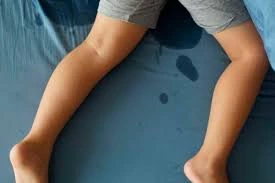Author's details
- Dr. Khashau Eleburuike
- MBBS (Ilorin) MSc. Global Health Karolinska Institute.
- Resident doctor in family medicine in Northern Sweden.
Reviewer's details
- Abdurrazzaq Alege
- MBBS, MBA (Healthcare Mgt), FMCPaed, FIPNA.
- Consultant Paediatrician/Paediatric Nephrologist, Federal Teaching Hospital, Katsina, Nigeria.

- Date Published: 2026-01-03
- Date Updated: 2025-04-28
Bedwetting (Enuresis) in Children
Key Messages
- Bedwetting is common in children and usually not their fault.
- Most children outgrow bedwetting naturally as they get older.
- Causes include delayed bladder development, deep sleep, genetics, and sometimes stress or medical issues.
- Punishment or blame makes things worse; support and patience are best.
- See a health worker if bedwetting starts suddenly, is painful, or continues past age
What is Bedwetting?
Bedwetting, or nocturnal enuresis, is when a child urinates during sleep without waking up. This is common among children under 7 years old and usually not a sign of a serious problem. Most children eventually outgrow it.
Yes, for many children it is normal. In Sub-Saharan Africa, like in other parts of the world, many children wet the bed into early childhood. About:
- 1 in 5 children aged 5 years still wet the bed
- 1 in 10 children aged 7 years
- By age 15, most children have outgrown it
Bedwetting is not the child’s fault. Possible causes include:
- Delayed bladder development
- Deep sleep: The child doesn’t wake when the bladder is full.
- Genetics: If parents were bedwetters, children are more likely to be.
- Stress or emotional factors: Such as moving homes, starting school, or family issues.
- Urinary tract infections (UTIs)
- Constipation
- Diabetes (rare but important to rule out).
| Bedwetting is caused by witchcraft or curses | No – it is a common medical and developmental issue |
| Myth | Truth |
| The child is lazy or doing it on purpose | Children do not wet the bed intentionally |
| Beating the child will make it stop | Punishment makes it worse and can lead to shame and stress |
| Traditional herbs will cure it | Most children outgrow bedwetting naturally. Seek medical advice before giving any herbal treatments |
What Parents Can Do
Be patient and supportive:
- Avoid blame, shame, or punishment
- Praise the child for dry nights
Encourage healthy habits:
- Limit drinking water 1–2 hours before bedtime
- Make sure the child uses the toilet before going to bed
- Create a calm bedtime routine
Use practical measures:
- Protect the mattress with a plastic cover
- Keep clean clothes and sheets ready just in case
- Encourage regular toilet use during the day
Talk to your child:
- Let the child know it’s not their fault
- Reassure them that many children experience this and get better with time
What Parents Should Avoid Doing to A bedwetting Child
- Do not abuse, blame or shout at the child
- Do not punish the child
- Do not excessively limit daytime fluids for the child
- Do not compare the child with other children
- Do not rely too much on drug treatment
- Do not completely ignore it especially if is beyond 7 years
When to See a Health Worker
Take your child to a clinic or hospital if:
- They suddenly start bedwetting after being dry for months
- They complain of pain while urinating
- There is blood in the urine
- They are over 7 and still wet the bed regularly
- You are worried about emotional or behavioral problems
In some areas, nurses or doctors may recommend:
- Urine tests (to check for infection or diabetes)
- Simple behavioral treatments
- In other cases, medication
Cultural Considerations in Sub-Saharan Africa
- Stigma: Bedwetting may be linked to myths or shame in some communities. Talking openly about it helps remove stigma.
- School-aged children may face bullying or embarrassment, especially during boarding school.
- Traditional beliefs: While elders and traditional healers may offer support, always combine with medical advice for the best outcomes.
Where to Get Help
- Local health clinic or hospital
- Community health workers
- School health programs
- NGOs or health outreach programs working in child health
- Bedwetting is common, treatable, and not the child’s fault
- Most children stop on their own
- Support, understanding, and simple changes can make a big difference
- World Health Organization (WHO). (2010). Primary Care: Management of Common Childhood Conditions.
https://www.who.int/publications/i/item/9789241599320 - Nevéus, T., et al. (2010). The standardization of terminology of lower urinary tract function in children and adolescents: Report from the ICCS. Journal of Urology, 183(4), 1291–1297.
- Hjalmas, K. (2002). Nocturnal enuresis: The role of the pediatrician. Pediatrics, 110(1), 168–170.
- Oyewole, O.E., et al. (2017). Management of nocturnal enuresis: Awareness and practice among primary health care physicians in Nigeria. Pan African Medical Journal, 28, 126.
- UNICEF. (2020). Child Health in Africa: A Data Profile. https://www.unicef.org
